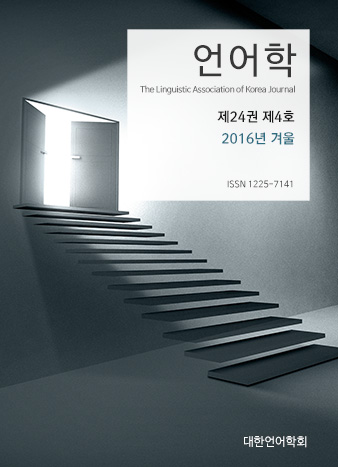대한언어학회 전자저널

-
An Alternative Approach to Realizations of the Medial [nt] Cluster in English
-
Boundary and pitch effects on the perception of Korean alveolar nasal
-
Corpus-Based English Grammar Instruction in a Korean College Context Korean College Context
-
A Study on the Relationship between Self-Efficacy Beliefs and Comprehension in English Reading
24권 4호 (2016년 12월)
Abstract
Keywords
# pragmatic scope # indefinites # indefinite adverbs # age and gender difference in the use of indefinites
References
- Hong, M. (2004). Focused indefinites and emphatic assertion in Korean. The Linguistic Association of Korea Journal, 12(3), 59-79.
- Ionin, T. (2010). The scope of indefinites: An experimental investigation. Nat Lang Semantics, 18, 295-350.
- Ioup, G. (1975). Some universals for quantifier scope. In J. Kimball (Ed.), Syntax and semantics, 4 (pp. 37-58). New York: Academic Press.
- Joh, Y. (2014). English each and Korean kakkak. The Journal of Modern British & American Language & Literature, 32(2), 31-50.
- Kang, H. K. (2001). Quantifier spreading: Linguistic and pragmatic considerations. Lingua, 111, 591-627.
- Kang, H. L. (2010). Presentation methods for co-occurrence information of adverbs with negativity and adverb vocabularies: Focused on cenhye (never) and pyelo (not much). The Education of Korean Language and Culture, 4(1), 25-52.
- Kim, H. (2009). The usage of degree adverbs in spoken language. Master’s Thesis, Korea University.
- Kim, M. (2004). The collective and distributive interpretation in second language acquisition: Evidence from Korean EFL learners. Korean Journal of Applied Linguistics, 20(1), 1-15.
- Kim, M. (2010). Korean EFL learners’ interpretation of quantifier-negation scope interaction in English. English Studies, 16(1), 164-183.
- Kim, T. & Lee, H. (2010). An empirical approach to quantifier floating in Korean. The Linguistic Association of Korean Journal, 18(1), 1-20.
- Lee, B. (2001). The semantics and problems of indefinite descriptions, The New Studies of English Language & Literature, 20, 163-181.
- Lee, K. (2013). Focus and floating numeral quantifiers in Korean. Master’s Thesis, Kyungpook National University.
- Lee, W. (2012). A study of negativity adverbs in Korean language education. Master’s Thesis, Hankuk University of Foreign Studies.
- Lim, D. (2015). What the partitive reading of floating quantifiers in Korean tells us about the Korean extended DP structure. Eoneohag, 73, 59-80.
- Marsden, H. (2004). L2 knowledge of quantifier scope in Korean and English learners of Japanese. In M. Cazzoli-Goeta, M. Mukai & L. Van Espen (Eds.), Durham working papers in linguistics, 10 (pp. 137-150), Durham: University of Durham, School of Linguistics and Language.
- Miyagawa, S. (2006). Locality in syntax and floated numeral quantifiers in Japanese and Korean. Japanese Korean Linguistics, 14, 270-282.
- Mo, S. (2012). A study on the Korean temporal adverbs ‘ajik’ ‘yeotae’. Master’s Thesis, Yonsei University Weonju Campus.
- Oh, Y. (2014). L2 English speakers’ acquisition of English universal quantifiers. Ph.D Thesis. Chonnam National University.
- Park, C. (2012). Quantifiers and meaning. Korean Semantics, 39, 1-23.
- Park, Y. (2007). A Study of the semantic characteristics of the proportional quantifier floating in Korean. Master’s Thesis, Seoul National University.
- Parreira, A. & Lorga, A. (2016). The use of numerical value of adverbs of quantity and frequency in the measurement of behavior patterns: Transforming ordinal scales into interval scales. Ensaio, 24, 109-126.
- Rakhlin, N. (2007). A new pragmatic account of quantifier-spreading. Nanzan Linguistics, 3(1), 239-282.
- Shin, K. (2009). Numeral quantifiers: NP modifiers and relational quantity nominals. Language Research, 45(1), 131-156.
- Shin, K. (2014). English floating quantifiers as intensifiers. The 21st Century Association of English Language and Literature, 21, 373-393.
- Tunstall, S. (1998). The interpretation of quantifiers: Semantics and processing. Ph.D Thesis, University of Massachusetts Amherst.
- Yoo, M. (2014). Scope interpretation of sentences with double quantifiers by native and Korean speakers of English: A case study of double object and to-dative constructions. Master’s Thesis, Ewha Womens University.
- Yun, E. (1996). Discourse representation theory and the semantic interpretation of quantifiers. Ph.D Thesis. Chonnam National University.
- Yun, H. (2004). Scope ambiguity in discourse representation theory. Journal of Language Sciences, 11(1), 165-181.